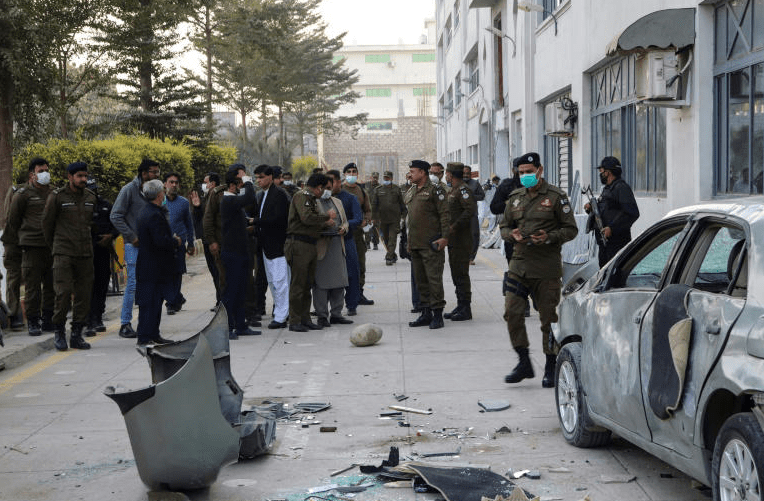Sri Lankan factory manager in Pakistan was on Friday beaten to death and set ablaze by a mob, police confirmed, in an incident local media reported was linked to alleged blasphemy.
Prime Minister Imran Khan said he would personally oversee an investigation into “the horrific vigilante attack” which he also called “a day of shame for Pakistan”.
“Let there be no mistake all those responsible will be punished with full severity of the law,” he tweeted.
Friday’s incident took place in Sialkot, about 200 kilometres (125 miles) southeast of the capital Islamabad.
Several gruesome video clips shared on social media showed a mob beating the prone victim while chanting slogans against blasphemy.
Other clips showed his body set ablaze, as well as the overturned wreckage of what was said to be his car.
Many in the mob made no attempt to hide their identity and some took selfies in front of the burning corpse.
Punjab government spokesman Hasaan Khawar told reporters in Lahore that police have already arrested 50 people.
“CCTV footage is being carefully looked into as we have been directed to complete the inquiry within 48 hours,” he said.
The slogans chanted in the social media videos were the same used by supporters of the Tehreek-e-Labbaik Pakistan (TLP) — an anti-blasphemy party.
The TLP has in the past paralysed the country with protests, including an anti-France campaign after Paris-based satirical magazine Charlie Hebdo last year republished cartoons depicting the Prophet Mohammed.
It was only unbanned last month and its leader freed from detention after another period of civil unrest in which seven police officers were killed.
In just five years the party has seen its reach explode in Pakistan, opening a new chapter in the country’s deadly confrontation with extremism.
On Sunday thousands of people torched a police station in northwestern Khyber Pakhtunkhwa province after demanding officers hand over a man accused of burning the Koran.
In April 2017 an angry mob lynched university student Mashal Khan when he was accused of posting blasphemous content online.
A Christian couple was lynched then burnt in a kiln in Punjab in 2014 after being falsely accused of desecrating the Koran.
A senior Pakistan official told AFP that Islamabad had been in touch with Sri Lankan diplomats over the incident “and have assured them that all those involved in the heinous crime will be brought to justice”.
Rights groups say accusations of blasphemy can often be wielded to settle personal vendettas, with minorities largely the target.
“Today’s event underscores the urgency with which an environment that enables abuse and puts lives at risk must be rectified,” Amnesty International South Asia said in a tweet under the hashtag “Sialkot”, which was trending in Pakistan.
It was only unbanned last month and its leader freed from detention after another period of civil unrest in which seven police officers were killed.
In just five years the party has seen its reach explode in Pakistan, opening a new chapter in the country’s deadly confrontation with extremism.
On Sunday thousands of people torched a police station in northwestern Khyber Pakhtunkhwa province after demanding officers hand over a man accused of burning the Koran.
In April 2017 an angry mob lynched university student Mashal Khan when he was accused of posting blasphemous content online.
A Christian couple was lynched then burnt in a kiln in Punjab in 2014 after being falsely accused of desecrating the Koran.
A senior Pakistan official told AFP that Islamabad had been in touch with Sri Lankan diplomats over the incident “and have assured them that all those involved in the heinous crime will be brought to justice”.
Rights groups say accusations of blasphemy can often be wielded to settle personal vendettas, with minorities largely the target.
“Today’s event underscores the urgency with which an environment that enables abuse and puts lives at risk must be rectified,” Amnesty International South Asia said in a tweet under the hashtag “Sialkot”, which was trending in Pakistan.




Comments are closed.